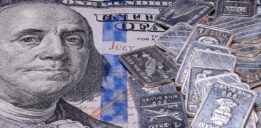Cautious Moves by Central Banks Help Push Gold Prices
Cautious moves from the European Central Bank and the U.S. Federal Reserve have helped push gold prices higher, even as the U.S. dollar climbs.
Nevertheless, in March, the U.S. Federal Reserve was in large part responsible for the many price swings that the gold market experienced, both up and down. Now, analysts are watching the European Central Bank to hold a similar sway over the precious metal.
The price of the valuable yellow commodity fell slightly in recent days. Its rise was previously jump-started due to various political confrontations which have since calmed—even if only slightly. That relief in the political realm sent investors once again looking away from the non-yield-accumulating gold for more traditional assets.
The French election was another source of the gold push, once again sending investors toward the metal in order to hedge against a potential far-right National Front party win. But, with the polls pointing toward a likely National Front defeat, gold prices have suffered as a result.
The European Central Bank, however, is unlikely to make any aggressive moves, due to both the impending Brexit in the U.K., as well as the runoff election in France involving the National Front. Unwilling to chance a potential upset due to European interference, it is likely that the European Central Bank will remain rather subdued, at least until the end of the French elections and possibly longer, which will be a boon to gold investors. (Source: “Gold prices look ready to snap three-day slide,” MarketWatch, April 27, 2017.)
Gold was trading around $1,265 for much of Thursday, with prices rising and falling throughout the day.
Analysts believe that gold still has a good way to go in 2017, spurred on by volatile economic times and unstable political dealings.
The U.S. dollar climbed as well. The American dollar usually rises or falls in an inverse relationship with gold, but today both the Greenback and gold bullion were able to mark simultaneous gains.






